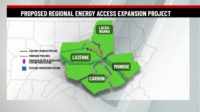Communities and project participants in New Jersey are awaiting details that will implement legislation signed Sept. 18 by Gov. Phil Murphy (D) that sets what may be the most restrictive “environmental justice” rules in the U.S. on how or whether certain pollution-emitting facilities are built in “overburdened communities.’’
The law will apply to new or expanded projects—including 10-MW or larger power plants, incinerators, waste recycling facilities, sewage treatment plants larger than 50 million gallons per day, landfill, waste recycling plants and other projects defined as air pollution sources under the U.S. Clean Air Act—in communities with large minority and low-income populations that meet state criteria.
New Jersey identified 310 possibly affected municipalities, but agencies have 120 days to finalize the list and no deadline is clear for rules to set permit conditions.
State environmental justice advocates cheered the new law as long overdue. "This law will bring with it a sea change in how government looks at its ultimate responsibility to ensure the rights of its people to clean air and clean water," Murphy said
But project developers raise concerns. “This could add uncertainties and delays … at a time when the state’s infrastructure is in dire need of repair and replacement,” says Michael A. Travostino, a government affairs official for the Associated Construction Contractors of New Jersey, adding that he expects new projects “will be slow to break ground.” I
It is not clear how the law will affect a planned $546-million gas-fired power plant and power upgrade system in Kearny in northern New Jersey that NJ Transit seeks to build to boost power on shared Northeast Corridor rail lines, but observers point to possible exemptions in the law for projects with "a compelling public interest."
Meanwhile, other states are eyeing similar curbs.
In new rules being developed that will affect state oil and gas producers, Colorado is looking to include rules to require those seeking well drilling permits consider the proximity of minority and low-income residents. It also plans to study such proposed projects more closely.
Colorado is set to issue the new industry rules in October, which observers say would make it the first oil and gas-producing state to do so.






Post a comment to this article
Report Abusive Comment